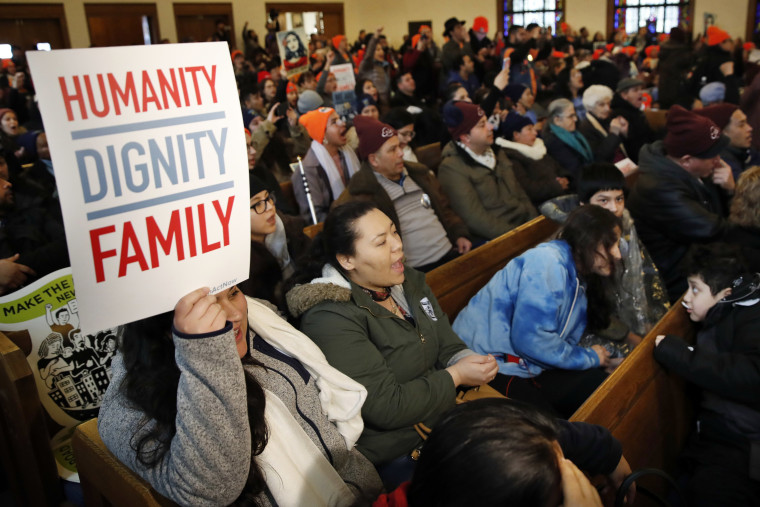WASHINGTON — From calls for him to step down to accusations that he’s disconnected, the barbs are flying at White House Chief of Staff John Kelly who said some immigrants were “too lazy to get off their asses” and apply for protection from deportation.
To critics, the comment has further verified beliefs that the Trump administration’s crackdown on immigration is based on racism and nativist ideas and that rhetoric and ideology, rather than facts, are guiding the policy making on the issue.
“John Kelly’s grossly uninformed comments underscore how hateful stereotyping of immigration permeates the White House,” said Brent Wilkes, president of the League of United Latin American Citizens, in a statement that demanded Kelly step down.
“He shares many of the views of the administration, like those of (Trump senior policy adviser) Stephen Miller, who thinks Mexicans are rapists and criminals and now, lazy,” said Cesar Vargas, an attorney and immigration activist.
To immigration experts and advocates, his remarks are also simply not accurate.
The Migration Policy Institute estimated that in 2016, there were 1.85 million immigrants eligible to apply for DACA, but only about 1.3 million immigrants were old enough (16) or had the education and residency requirements to qualify.
Michelle Mittelstadt, a spokeswoman for the institute, said examining the intensity of interest in DACA requires looking at who applied.
The latest numbers from Citizenship and Immigration Services show that as of Sept. 30 of last year, 956,289 or 72 percent of the eligible 1.3 million had applied since DACA applications were first taken in 2012, Mittelstadt said.
Roberto Gonzales, an expert on DACA youth and author of “Lives in Limbo: Undocumented and Coming of Age in America,” said Kelly is “relying on an old stereotype” by calling those who did not apply “lazy.”
The comment was made worse, said Gonzales, by the fact that the overwhelming majority of immigrants who are undocumented or have DACA are Latino and most of the Latino immigrants are Mexican. Lazy has often been used against Mexicans as a racial slur.
Data shows that about two-thirds of immigrants from Mexico and El Salvador who were eligible for DACA applied, according to Gonzales.
“Not only is this a kind of stereotyping to appeal to a very small segment of the American population that is restrictionist, it is also factually incorrect.,” said Gonzales, an education professor at the Harvard Graduate School of Education.
He said his 2013 survey on 2,700 DACA eligible young adults – the National Undacamented Research Project - found that 85 percent of those surveyed had at some time in their life worked for pay.
“That belies any kind of claim that this is a population that is looking for a free ride, is lazy or not participating.”
In an interview with MSNBC, Rep. Carlos Curbelo, R-Fla., told MSNBC that Kelly seemed to be "expressing the views of others."
"But why, why say that when we know that a lot of these young people that did come forward it took a lot of courage," said Curbelo, a Republican legislator who represents a majority-Latino district in Miami.
Kelly made the comments that are causing the uproar on Monday. He said that some immigrants don’t have protection from deportation under the Deferred Action for Childhood Arrivals, better known as DACA, program because “some would say they were too afraid to sign up, others would say they were too lazy to get off their asses.”
Angie Kim, who runs community engagement and advocacy at the National Korean American Service & Education Consortium, NAKASEC, said Kelly was bullying vulnerable immigrants faced with difficult choices.
"There are numerous reasons as to why not all 1.8 million underprivileged and marginalized young immigrants can meet the needs to apply for the DACA program," Kim said.
In the Asian American and Pacific Islander community there is a greater struggle with the cultural stigma of acknowledging being in the U.S. without legal permission.
"His comments about immigrants being lazy are wrong and offensive," said Rep. Ted Lieu, D-Calif.
Like the indigenous populations in the Latino community and Caribbean and African communities, there is also a problem of language barriers and sufficient outreach to people none too eager to expose themselves.
"Our reality is we have to choose to come out of the shadows to apply for temporary relief or risk deportations by registering our information with a branch of government that embraces anti-immigrant sentiments and xenophobia," Kim said.
For many, real fears
The fears are not baseless. A Texas judge in 2016 lawsuit to end the DACA program had demanded that identifying information on about 50,0000 DACA recipients be turned over to the court.
The Department of Homeland Security has said it would not turn over DACA recipients' information to Immigration and Customs Enforcement or Border Patrol "proactively" but might share information if the agencies request information on someone they say they have reason to deport.
On Monday, Kelly also told reporters that DACA recipients aren't a priority for deportation if their DACA ends. But under the Trump administration, ICE agents have arrested people they encounter while arresting people they've targeted. They refer to the non-targeted arrests as "collateral arrests."

Vargas, who helps clients apply for DACA, said Kelly is right that people are afraid. But he said many of his clients "are still very reluctant to renew (their DACA) because of what is happening in the White House. Kelly is disconnected with what is happening on the ground.”
He said Kelly, a former general in the Marines, is regarding the situation as a military man who expects soldiers to carry out orders and if they don’t “it’s on you.”
“I doubt he’s seen a DACA application and how much information you have to give and the process it takes to get it approved,” Vargas said.
The DACA application is a seven-page form. Applicants also must fill out a form for a work permit and supplemental form on economic need to work. Vargas said he had to write an essay explaining why he should get DACA, when he first applied.
Along with the forms and accompanying fees, DACA applicants must go to an authorized facility to have their fingerprints taken electronically. The fees total $495.
They also must gather numerous documents such as passport, birth certificate, records of any traffic ticket or other minor violations, school records and proof of entry such as tax forms and employment records, photographs and more. Copies of those documents also may come with fees.
Kelly acknowledged separately the possibility that some people hadn’t heard about the DACA program, but he maintained that some “just should’ve probably gotten off the couch and signed up.”
Maricela Ramirez, 30, said she had little fear when she applied for DACA in 2012 and saw it as an opportunity, even though she knew it wasn’t permanent. But in her latest renewal in March, giving her DACA through 2019, she said she did have to swallow some fear.
“You don’t know what is going to happen later on, reapplying or not reapplying, there is nothing to hold onto but hope without a permanent solution,” said Ramirez, who attended a rally of immigrants that drew an estimated 600 people to Lutheran Church of the Reformation in Washington, D.C.
Ramirez said she was unable to go to college without DACA. She worked in her parents' business. Now with DACA, she owns two businesses in New York and is planning to go back to school.
There are about 690,000 immigrants who have DACA but there are many more who don’t meet the eligibility requirements or have not applied for DACA.
President Donald Trump has demanded a border wall, restrictions on legal immigration and the elimination of the diversity visa lottery in exchange for a path to citizenship for 1.8 million immigrants, most of them younger people who have been in the country since they were children.
Gil Perez, 34, said he has been in the U.S. 20 years and has no criminal record. He is undocumented, but risked going to the Washington, D.C. rally to stand up for families like his who have fled violence in Mexico or their country.
“We are here,” he said. “We are fighting. I came from New York here to help our family, from very early in the morning, at 5 am.”
